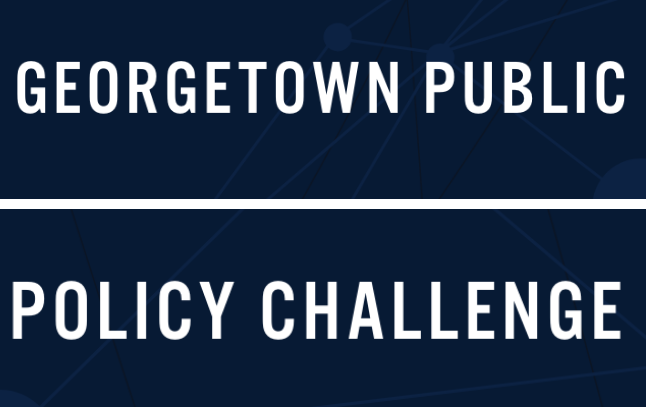Students address community health, food insecurityand other issues affecting low-income Washingtonians
The 5th annual Georgetown Public Policy Challenge tasked graduate students with developing innovative policy solutions to address local or regional issues in Washington, DC.
The 5th annual Georgetown Public Policy Challenge tasked graduate students with developing innovative policy solutions to address local or regional issues in Washington, DC. Graduate students from across disciplines on the Hilltop came together to present ideas for fixing local policy problems. Each team made a 10-minute presentation to a panel of judges in the preliminary round, and five teams advanced to the finals, which took place on Friday, March 22.The winning team, Breathe Easy, received ,500, and each finalist received 0. Read on to learn more about each of the five 2019 finalists:
Breathe Easy: The District of Columbia is the third worst state in the country for incidence of asthma. Emilia Calma (MPP‘20) and Lina Stolyar (MPP‘20) developed Breathe Easy, a proposal to address the heterogeneously high incidence of asthma across Washington, DC, especially in Wards 7 and 8. They are proposing a corps of community health workers who visit families at their homes and provide asthma education, guidance on medication management, and more. Leveraging their experience at the Policy Innovation Lab, Lina and Emilia hope to cut down on ER utilization for asthma and help DC do a better job with preventive, rather than reactive, care.
Banana Snap: Low-income households in DC are more exposed to food insecurity and have fewer healthy food options. Banana Snap is a mobile application designed to help residents in food deserts, like those in DC Wards 7 and 8, receive nutritional information about and order fresh produce to be delivered to nearby food lockers. The app is developed by Eric Chu, Margaret Chu, Parker Essick, and Olawunmi Ola-Busari of the Global Human Development Program at the Walsh School of Foreign Service. The team’s work in global poverty alleviation led them to develop the app in hopes that in the short term, disproportionately impacted citizens in Wards 7 and 8, and other food deserts in the District of Columbia, can access fresh produce. In the longer term, the app can help demonstrate demand for better food in these areas that will hopefully be met in the market.
Rat0: By some measures, Washington is the fourth “rattiest” city in the country. To tackle the citywide rat infestation, McCourt students Fangwen Zhang (MPP‘19), Gaoqi Zhang (MPP‘20), Shanlin Huang (MPP’19), Shiying Wang (MPP‘20), and Ruilian Xie (MPP‘19) designed Rat0. The initiative will replace open waste receptacles throughout the city with trash cans with metal lids operated by foot pedals, depriving the rats of a primary food source. By first placing these new bins in Dupont Circle and tracking 311 complaint calls and public health reports citing rats, the team hopes to deploy their solution more widely and ultimately see other cities in the U.S. copycat the project.
FHAIR: Like most metropolitan areas in the United States, DC has a dearth of affordable housing. Low-income tenants relying on government assistance are in especially dire straits, as observed by Kellen MacBeth (MPM‘20) and Michael Pruitt (MPM‘20). The proposal includes a series of cost-neutral changes to existing policy, including the prohibition of discrimination based on a person’s source of income, the expansion of a state tax credit program, and engaging with key stakeholders through regular forums. Drawing on his experience as the Chair of Arlington’s Tenant-Landlord Commission, Kellen hopes to create an environment in Arlington where recipients of government housing aid are not denied a roof based solely on their means of funding.
R2DC: Since the incarceration and release of people from DC who are imprisoned is managed by the Federal Bureau of Prisons, they are often sent to facilities across the country far away from many of the DC-based agencies that are intended to help them navigate their release. McCourt students Andrew Debraggio (MPP‘20), Leanna Diggs (MPP‘19), and Nathan Legg (MPP-E‘20) are proposing R2DC to empower returning DC citizens by allowing them to develop individualized plans to assist them once they are released. The initiative is a collaboration with Rivers Correctional Institute (RCI), a privately-run facility in North Carolina with the 2nd highest quantity of DC residents throughout federal prisons, to streamline the reentry process. The team hopes to work with the community to measure the success of their program by gauging the civic engagement of returning citizens and tracking recidivism.
